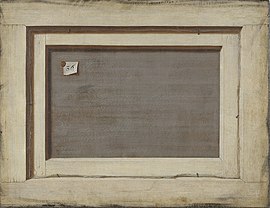The Reverse of a Framed Painting
| The Reverse of a Framed Painting | |
|---|---|
 | |
| Artist | Cornelius Norbertus Gysbrechts |
| Year | 1670 |
| Medium | Oil on canvas |
| Dimensions | 66.4 cm × 87 cm (26.1 in × 34 in) |
| Location | Statens Museum for Kunst |
The Reverse of a Framed Painting (in Danish: Bagsiden af et indrammet maleri) is a still life trompe-l'œil painting by Flemish painter Cornelius Norbertus Gysbrechts, made in 1670,[1] when the artist was working as the official painter of the Danish royal court. The painting is commonly considered a masterpiece of trompe-l'œil painting[2] for its deceptively sculptural representation of the back of a framed painting in a canvas.
The work has already been called as "the most radical meditation about painting as an object and as an image",[3] and is interpreted as an early example of conceptual art.[4]
History
The first bibliographic reference mentioning the existence of the painting was the inventory of 1 August 1674 of the Kunstkammer of the royal family of Denmark, during the reign of Christian V of Denmark, although it is believed that this was a commission of the former king, Frederick III of Denmark, since he had interest in collectionism[5] and, especially, in Flemish painting, which could have led him to hire Cornelius Gysbrechts for the position of royal court painter.
Technique
The original approach of the trompe-l'œil technique on the work, at the time, allowed the viewer to see it as an object of curiosity, suitable to be shown in a Kunstkammer, such as the intention of the painter. In order to reinforce its illusion, the painting was supposedly exhibited leaning on the entrance hall of the Royal Danish Kunstkammer,[6] suggesting the idea that the painting was just a frame, yet to be hung up. Even today, the painting is exhibited in this way at the Statens Museum for Kunst.
Bibliography
- Stoichiţă, Victor I. The self-aware image: an insight into early modern meta-painting. Cambridge University Press, 1997.
- Hein, Jorgen and Peter Kristiansen. Rosenborg Castle: a guide to the Danish collection. Copenhagen: Rosenborg, 1999.
- Schifferer, Sybille Ebert. Deceptions and Illusions: Five Centuries of Trompe L'Oeil Painting. London: Lund Humphries, 2003.
- Anderberg, Brigitte [et al.]. SMK Highlights: Statens Museum for Kunst. Copenhagen: Statens Museum for Kunst, 2008.
References
- ^ Gammelbo, Poul (1960). Dutch Still-Life Painting from the 16th to the 18th centuries in Danish collections. Copenhagen: Munksgaard.
- ^ Hollmann, Eckhard (2004). A Trick Of The Eye: Trompe L'oeil Masterpieces. Munich: Prestel Publishing.
- ^ Stoichita, Victor (2019). A Instauração do Quadro: Metapintura nos Inícios dos Tempos Modernos. Lisboa: KKYM. p. 334.
- ^ Lenain, Thierry (1984). Le dernier tableau de Marcel Duchamp: du trompe-l'oeil au regard désabusé. pp. 87–102.
- ^ Koester, Olaf (2000). Flemish Paintings 1600–1800. Statens Museum for Kunst. p. 9.
- ^ "The Reverse of a Framed Painting, 1670". SMK – National Gallery of Denmark in Copenhagen (Statens Museum for Kunst). 2018-07-02. Retrieved 2021-01-21.
